Photographs: Reuters Aziz Haniffa in Washington, DC
Leading South Asia experts have pilloried United States President Barack Obama's administration for assigning a major role for China in South Asia even as it acknowledged India's sensitivities over such an involvement by Beijing.
Lisa Curtis, director of the South Asia programme at The Heritage Foundation, told Rediff.com, "The Obama administration came into office with the goal of encouraging China to play a constructive role in helping to stabilise Afghanistan and Pakistan. Instead, China appears to be pressing forward with plans to construct new nuclear reactors in Pakistan, despite reservations from the US and other members of the Nuclear Suppliers Group, and is taking a more assertive position with regard to its own territorial claims in the region."
Curtis, an erstwhile South Asia analyst for the Central Intelligence Agency, noted: "China is putting pressure on India on their border disputes, and increasingly taking steps that call into question Indian sovereignty over the states of Jammu and Kashmir and Arunachal Pradesh, and also China's refusal last month to grant a visa to an Indian general (Lieutenant General B S Jaswal) in charge of the Northern Command, which includes parts of Kashmir, was seen in New Delhi as one more sign China is intent on asserting its influence in South Asia in a way that seeks to intimidate India."
"In this light," she reiterated, "Deputy Secretary of State James Steinberg's comments that paint a picture of a benign Chinese role in South Asia come across as dangerously naive to those sitting in India."
...
'China has been nothing short of provocative towards India'
Image: President Obama at a meeting with senior White House officialsPhotographs: Reuters
China, she added, "prefers to deal with Pakistan on a strictly bilateral basis on these issues and has shown little enthusiasm for working in tandem with US officials on this issue."
Deepa Ollapally, associate director, Sigur Centre for Asian Studies at George Washington University, told Rediff.com, "Steinberg's comments could not have come at a worse moment."
"China, " she pointed out, "has been nothing short of provocative over the past several weeks towards India," and in echoing Curtis's sentiments, also pointed to the denial of a visa to General Jaswal "because he headed up troops in Kashmir which China considers a disputed territory, to the presence of 11,000 Chinese troops in Pakistan's side of Kashmir."
"Given this backdrop," Ollapally argued, "giving the Chinese a US stamp of approval for their activities in South Asia at this point shows a real lack of concern for India's difficult position."
'India's role in South Asia remains theoretical'
Image: Obama may have changed lanes on IndiaPhotographs: Reuters
"I think New Delhi would be completely justified in getting bent out of shape," Ollapally added.
Steinberg, in his remarks at a conference at the Woodrow Wilson Centre for International Scholars in Washington, DC, on Monday, had said just as much as China had a role in South Asia, the US saw a role for India in East Asia.
'Just as we talk about South Asia with China, we talk about East Asia with India, and that's an important part of our dialogue,' he had said.
'We just had a very, very productive meeting chaired on our side by Assistant Secretary (Kurt) Campbell with the Indian counterparts, and I think it's notable that -- as you all know -- Secretary Campbell is not the assistant secretary for South Asia, he's the assistant secretary for East Asia,' he had added.
Steinberg said the dialogue that Campbell had with his Indian counterparts was because 'We see India as an East Asia country. We engage with them on issues like North Korea and the like because we think of the importance that India plays.'
Is Obama aware of Indian sensitivities?
Image: Deputy Secretary of State James SteinbergPhotographs: Reuters
Walter Andersen, who for the last several years of his tenure headed the State Department's South Asia division of the Intelligence and Research Bureau, told Rediff.com, "Steinberg was asked a question difficult for a senior government official to answer and he gave predictably a highly ambiguous answer at a very high level of generality."
"His bottom line was that 'We welcome a constructive involvement by China,' which is hard to criticise because it says so little," Andersen, now associate director of the South Asia Department at the Johns Hopkins University's School of Advanced International Studies, said.
Contrary to the opinion of others, Andersen added that "this administration is well aware of Indian sensitivities on the subject and Steinberg balanced his statement about involvement of China in South Asia with his view that India should be involved in East Asia and that the US was talking to India at the highest level about matters involving East Asia."
What Steinberg left out in his answer
Image: Obama at the Great Wall of China last yearPhotographs: Reuters
He also felt Steinberg had ignored or glossed over "reports of Chinese troop presence in the northern areas of Pakistani Kashmir, and in fact, he did not get down to any specifics at all, and I am sure was deliberate. So, it was a very diplomatic answer."
"That said," Andersen argued that "the deputy secretary and other officials will need to be more careful in their choice of words on an issue of such importance to India as China's relationships with South Asia, especially before the president's visit to India in which he hopes for some major transformational agreements that will put the relationship on a higher level."
He said "this caution is especially important for any official document on the issue," and recalled that "the joint statement in China that the Indians found so offensive -- that is, about US and China working together on contentious issues in South Asia -- last year was probably drafted without much input from anyone who knew South Asia or India well -- and apparently without consulting with people who do."
'India is a major player in Asia, not just South Asia'
Image: Obama listens to Prime Minister Manmohan Singh's address at the White House last NovemberPhotographs: Reuters
Teresita C Schaffer, another South Asia diplomatic veteran, also cut Steinberg some slack arguing that "the important thing about Steinberg's statement is that he emphasised India's role in East Asia, and more generally, in shaping the future of Asia."
"One of the most important developments in the administration's policy toward the region is its recognition that India is a major player in Asia, not just South but also East," she told rediff.com
Schaffer said that "as long as this wider concept of India's role is clear, I see no harm in acknowledging that it would be useful for China to encourage Pakistan along a more constructive path, and if you look at Steinberg's text, that's how I read it."

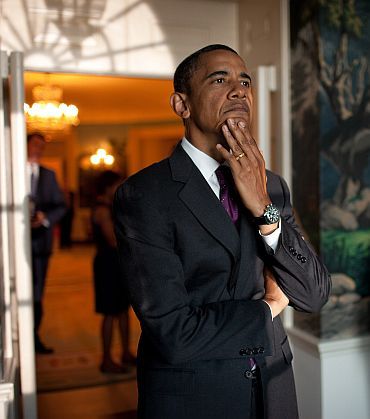
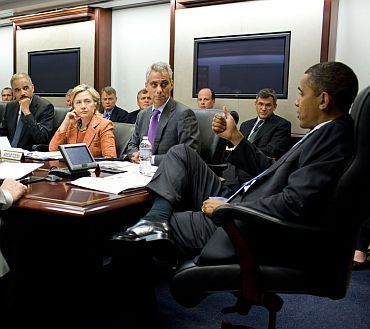
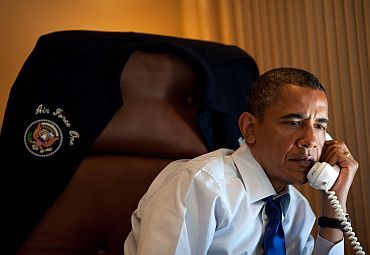
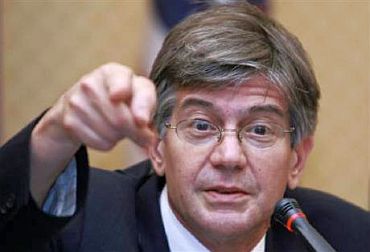
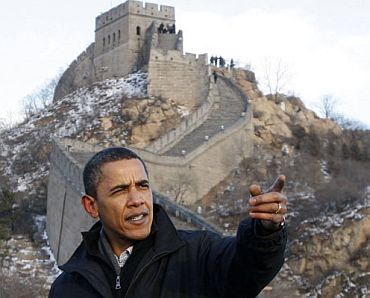
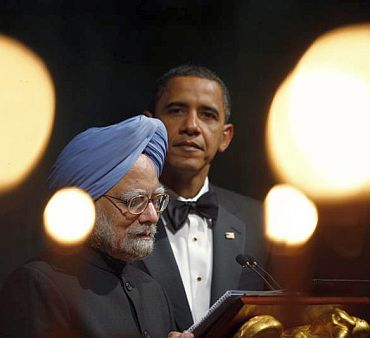
article